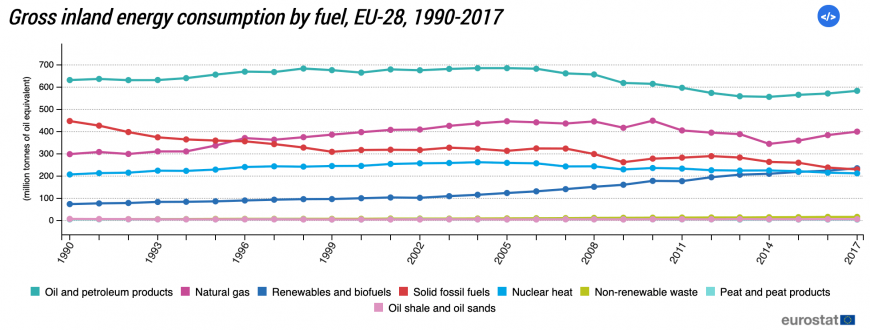
The world is moving towards green energy, but this does not mean that we can completely throw away fossil fuels. Fossil fuels are the most widely used energy sources in the world.
They account for ~80% of the total energy consumption. They were the fundamental drivers of the Industrial Revolution.

Fossil fuels include:
- Petroleum/Oil
- Coal
- Natural gas
They are used as a source of energy for:
- Heating
- Electricity
- Fuel for vehicles
But what are the pros and cons of fossil fuels, why are fossil fuels good, and why don’t we simply replace them with renewable energy?
Fossil fuel types
Petroleum (oil): It is a liquid and after its extraction, it is refined into other types of fuel such as airplane fuel, diesel, etc.

Coal: It is a carbon-based, combustible black rock. We can burn it for energy. Sadly, coal is the most harmful to the environment.

Natural Gas: It is a non-renewable, odorless, colorless, flammable, and non-toxic hydrocarbon. If we burn natural gas, it releases a significant amount of energy. It can be both gaseous and liquid (LNG).

Fossil fuels come from decomposed plants and animals buried deep under the Earth’s surface, for millions of years. That is why we call them non-renewable. If they are gone, we cannot produce more.
And it is the first disadvantage of fossil fuels. What are the disadvantages of using fossil fuels as an energy source?
Pros and cons of fossil fuels
Fossil fuel cons
1. Fossil fuels are not renewable energy sources
If we do not reduce consumption, we will run out of them, very quickly. In this case, very quickly means maybe in our life span.
According to Woldometers, we will run out of oil in 47 years, natural gas in 52 years, and coal in 133 years. In the long term, if we want to use energy sources that will never run out, there are better alternatives than fossil fuels.
2. Fossil fuels pollute the environment
Fossil fuels contribute to greenhouse gases, which is one of their major disadvantages. The most harmful for the environment is coal because it has many more harmful combustion products than other fossil fuels.
In contrast, natural gas is the most environmentally friendly fossil fuel simply because it burns much cleaner. It means that if we burn natural gas under perfect combustion circumstances, there will be minimal to no harmful compounds.
But the bottom line is that fossil fuels are probably the main contributors to global warming, which is a major fossil fuel disadvantage because it is one of the biggest threats to humanity. That is why we do not hear good things about fossil fuels.
3. In the case of irresponsible use, they can be dangerous
It is important to note that fossil fuels are not the most dangerous energy sources. If we compare them to nuclear energy, we can easily see that nuclear power is much more dangerous.
But, in case of irresponsible use, they may cause an accident. For example, natural gas is a really flammable energy source, which is both an advantage and a disadvantage. Because of its inflammability, natural gas is the most commonly used energy source in the EU. But on the other hand, it is a combustible material which can explode. This is the biggest disadvantage of natural gas.
But oil is not safer either. In 2010, an ultra-deepwater drilling rig called Deepwater Horizon exploded, causing the largest marine oil spill in history.
It shows that they can be dangerous not only to human life but to nature as well. But then why do we use them?
The critics of fossil fuels are much louder than the supporters. So, what are the advantages of fossil fuels?
Why is fossil fuel good?
1. Easier to store and transport
Fossil fuels can be transported quite easily. They are typically transported via international gas pipeline systems or with tankers.
Renewable energy sources cannot be stored efficiently. In contrast, fossil fuels can be stored for an indefinite period of time. It is beneficial because we can prepare for the times when we need them, such as winter.
2. It is really cheap
Since it has been used for centuries, we have a great and well-developed infrastructure for fossil fuels. It means that we can use them effectively, and they are relatively cheap.
If the circumstances are good, and the weather is mild, we can store the surplus, which means its price will fall. The price is also falling steadily due to the rise of renewable energy sources, which is not a drawback of using fossil fuels.
3. It is more reliable than renewable energy
One of the biggest disadvantages of renewable energy is that it depends on changes in the environment. If the wind blows or the sun shines, the solar panel’s or wind turbine’s operation is efficient. But if the conditions or the weather are not ideal, they use only half of their maximum capacity.
However, fossil fuel usage is completely under our control, and it does not depend on environmental factors.
Fossil fuels’ advantages and disadvantages — Conclusion
Petroleum, natural gas, and coal are the most widely used energy sources in the world. They account for ~80% of the total energy consumption.
There are a lot of well-known cons of fossil fuels, for example, their role in the greenhouse effect.
We do not often hear about the positives of fossil fuels. That is why it is worth considering the benefits of fossil fuels, too. We use them because they are cheap, effective, and reliable.
Like everything, all energy sources have their pros and cons. It is our job to find out what is the best both for the environment and for humanity.
